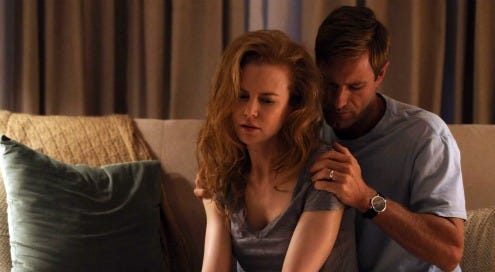Rabbit Hole

"Rabbit Hole" is a film that's steeped in sorrow, but watching it is a joyful experience — at least for those who appreciate finely drawn characters from fabulous actors who invest them with heft and heart.
Nicole Kidman and Aaron Eckhart play Becca and Howie Corbett, a couple in their late 30s who lost their 4-year-old son, Danny, eight months ago after he was hit by a car. Though the film is adapted from a play by David Lindsay-Abaire (who also wrote the screenplay), there's no theatricality to their performances; Howie and Becca feel like real, flawed people who could be living next door.
On the surface, Becca is the "problem" half of the couple. A homemaker who gave up her job at Sotheby's, she keeps the house and gardens ordered and neat like a good upstate New Yorker in the Martha Stewart mold. She's brittle and defensive, and at a group therapy meeting she mouths off at another grieving mother.
"It's just too much God talk for me," she complains, resolving to skip any future sessions.
A highly organized person, Becca has organized her grief in a way that's least painful for her.
Though Howie remains superficially gregarious and productive, there's a dark rage boiling inside him. On some level, he blames Becca for not watching Danny better, or he blames himself for leaving the gate open that allowed him to run into the street, or he blames the family dog for leading him out that gate.
While better hidden, Howie's sorrow is highly volatile, ready to erupt.
Becca is the sort who, when in pain, tends to lash out at those closest to her. Much of the brunt is borne by her mother, Nat (a superb Diane Wiest), a blue-collar churchgoing person who's somewhat mystified by the elegant, affluent woman her daughter has turned into.
Nat, who lost her own adult son to drug addiction, gives a moving speech about grief: At some point the weight of it becomes tolerable, she says, like a brick that you carry around in your purse. You occasionally forget about it, but it's always there because that's what you have left instead of your child.
Exacerbating Becca's anguish is the fact that her ne'er-do-well sister Izzy (Tammy Blanchard) has just become pregnant by her musician boyfriend (Giancarlo Esposito). Izzy's carefree, we'll-worry-tomorrow attitude flies in the face of Becca's carefully planned existence.
Ostensibly, she's worried that Izzy may not be ready to be a parent, but we suspect her real fear is that she'll prove a better mother than Becca herself.
A few other characters slide into the frame. There's Gaby (Sandra Oh), the organizer of the group therapy meetings, who forms a bond with Howie; they take to smoking pot in her car to loosen up before sessions (he continues to go even after Becca quits). Unlike Becca, Gaby is upfront about the loss of her child, which appeals to Howie's craving for empathy.
The most curious addition is Jason (Miles Teller), a 17-year-old who happened to be driving the car that killed Danny. It wasn't really his fault, but, like the others, Jason has come to internalize the tragedy. It's illustrated in a comic book he's writing about parallel universes that he shares with Becca, which gives the movie its name.
"Rabbit Hole" is directed by John Cameron Mitchell, whose two previous features — about a transvestite rock 'n' roller ("Hedwig and the Angry Inch") and an ensemble drama featuring graphic, unsimulated sexuality ("Shortbus") — might not seem an obvious choice for this unassuming character study.
But Mitchell has a sensitive touch with his actors that helps them deeply etch their characters into an audience's mind and soul. The performances are spectacular, but you won't catch anyone acting.
4.5 Yaps



